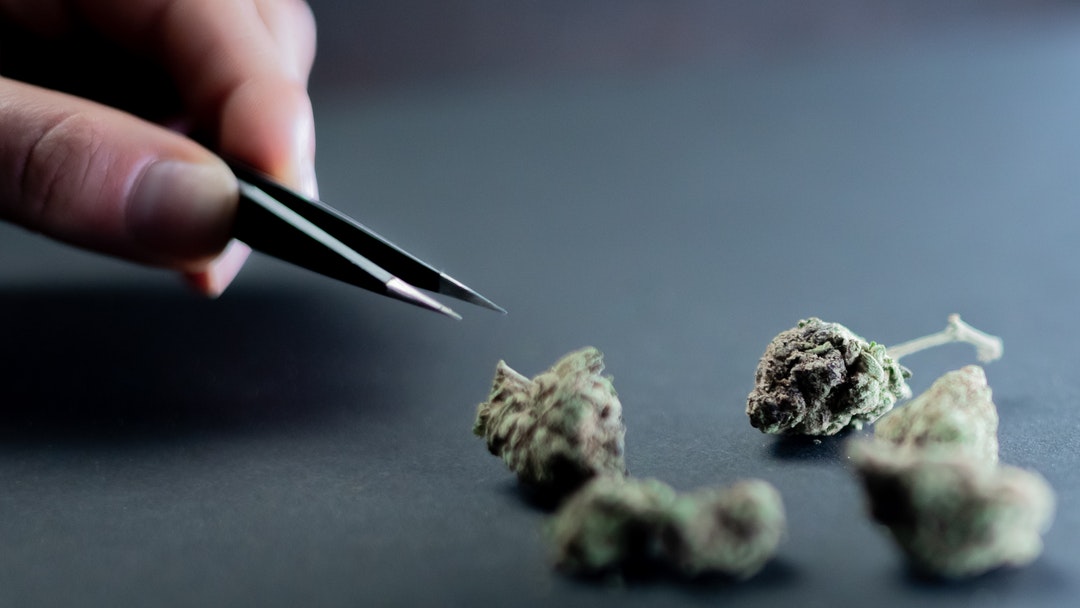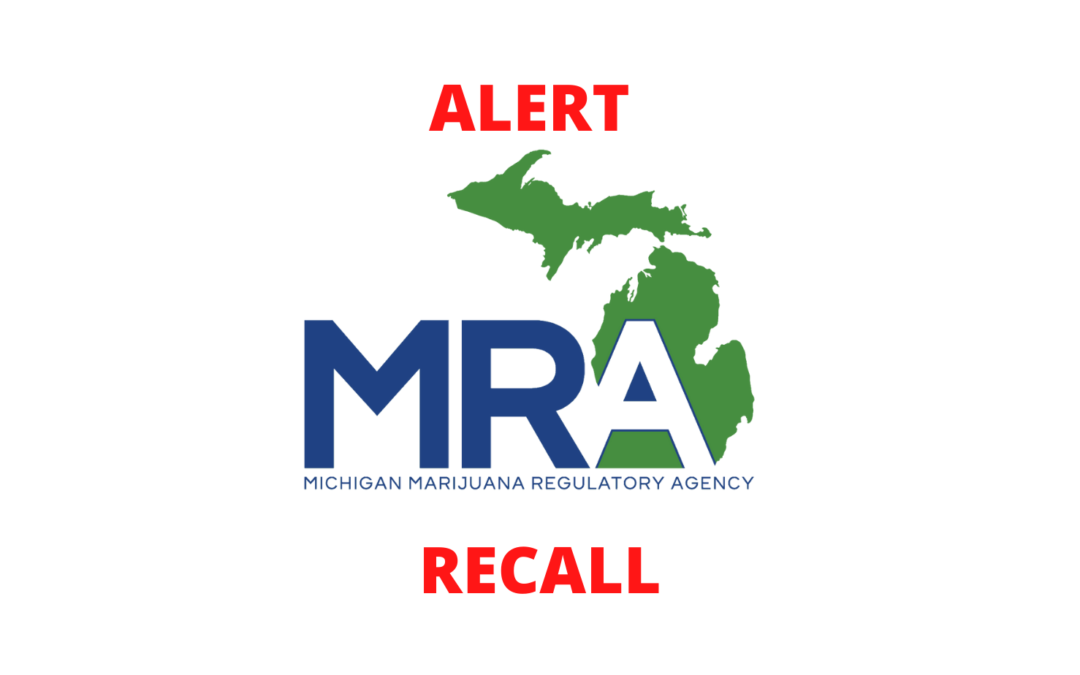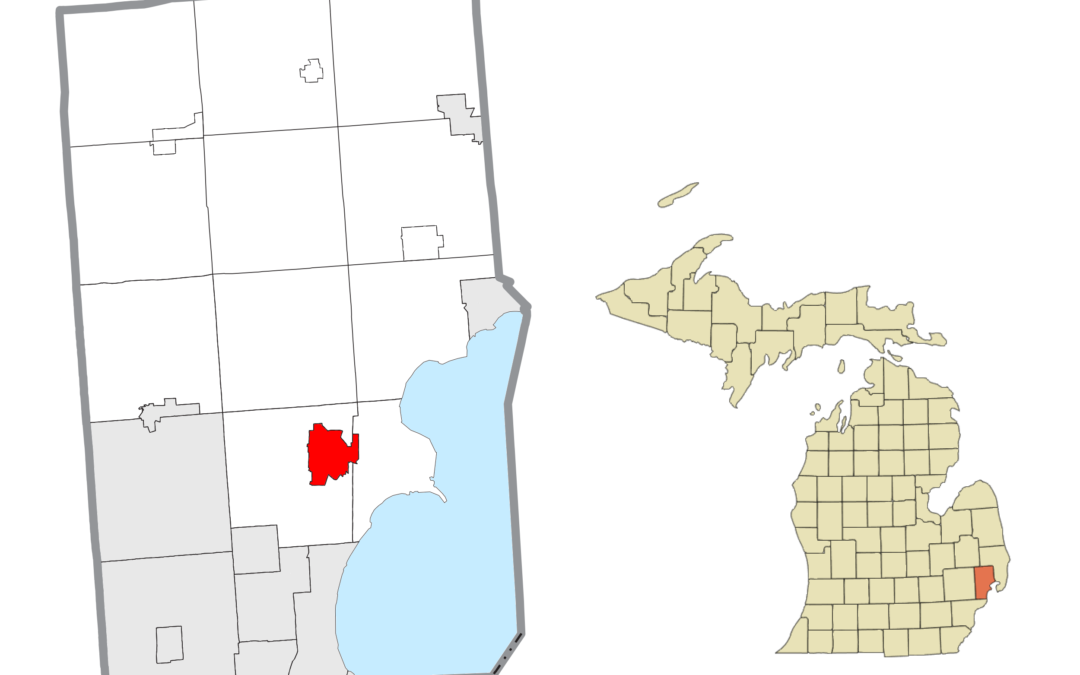
Nov 24, 2021 | Blog, Lab Scandals, News
A cannabis testing lab is suing the Michigan’s Marijuana Regulatory Agency over a major recall of cannabis products. Many products tested by Viridis Laboratories were pulled from shelves The marijuana products impacted have a test date between August 10, 2021 and November 16, 2021..
64,000-pound, $229 million Michigan marijuana recall is the result of bureaucratic ‘abuse,’ a lawsuit claims
The lawsuit filed Monday alleges state regulators acted in a discriminatory and predatory manner when they questioned the safety of a variety of cannabis products tested by Viridis Labs.
The recall is the largest in Michigan history and involves more than $200 million in pulled cannabis products across the state, according to a news release from Viridis’ attorneys.
Attorneys representing Viridis say the agency violated state law by not letting he company to present its case to an administrative law judge before shutting down the company’s labs.
“The recall is the latest and most egregious action by the MRA in a prolonged campaign of harassment aimed at Viridis,” said David Russell, an attorney with Foster, Swift, Collins & Smith, P.C. “Unfortunately, this latest effort by the MRA has caused huge disruption and chaos in the industry, harming small businesses and besmirching Viridis’ reputation with no basis in science.”
The recall affects numerous products processed by the company from early August to mid-November. It includes items tested at a Bay City location, although Virdis alleges that the products the MRA says failed retesting came exclusively from a Lansing location.
MRA officials declined to comment on the pending litigation.
MORE RELATED NEWS STORIES
See the recall notice issued 11-17-21 below
MRA RECALL NOTICE – Issued 11-17-21
Notification of Marijuana Product Recall
The Marijuana Regulatory Agency (MRA) has identified inaccurate and/or unreliable results of products tested by laboratories Viridis North, LLC and Viridis Laboratories, LLC.
In the interest of public health and safety, the MRA is issuing this health and safety advisory bulletin for all marijuana products tested by Viridis Laboratories, LLC (license numbers SC-000009 and AU-SC-000113) and Viridis North, LLC (license numbers SC-000014 and AU-SC-000103) except for inhalable marijuana concentrate products such as:
- Vape carts.
- Live resin.
- Distillate.
- Any other cannabis concentrate created through residual solvent extractions.
The marijuana products impacted have a test date between August 10, 2021 and November 16, 2021. All marijuana product labels are required to list the name and license number of the safety compliance facility that conducted the testing and date the product was tested.
Note: An MRA investigation is still on-going.
Consumers who have marijuana products in their possession that meet the recall criteria may return the products to the marijuana sales location where they were purchased for proper disposal. Consumers with weakened immune systems or lung disease are at the highest risk for health-related incidents such as aspergillosis, which can impact lung function, if these potentially harmful products are consumed.
Consumers who have experienced adverse reactions after using these products should report their symptoms and product use to their physician. Consumers are requested to report any adverse product reactions to the MRA via email: MRA-Enforcement@michigan.gov or via phone: 517-284-8599.
Marijuana sales locations that sold product covered by this bulletin must display this recall notice on the sales floor, visible to all customers, for 30 days from the date of this notice. Marijuana sales locations that receive adverse product reactions from consumers should report the adverse product reactions to the agency at MRA-Enforcement@michigan.gov and document these reports in METRC.
Licensees with products remaining in their inventory that meet the recall criteria have the following options:
- Destroy the product and provide proof of destruction: MRA-Compliance@michigan.gov.
- Have the product retested for the microbials compliance panel.
- Send the product back to the original licensee source so they can destroy or have the product retested as a larger batch.
LINK
MRA Public Health and Safety Advisory Bulletins
Komorn Law Social Media
Recent Posts
Tag Cloud
2021
BMMR
cannabis
CBD
corruption. prosecutors
dispensary
Driving
DUI
forfeiture
gun rights
hemp
komornlaw
lara
law enforcement abuse
laws
Legalization
marijuana
Medical Marijuana
Michigan
michigan laws
michigan news
MMFLA
MRA
news
police
politics
science
usa news
us supreme court
Your Rights
DISCLAIMER
This post may contain re-posted content, opinions, comments, ads, third party posts, outdated information, posts from disgruntled persons, posts from those with agendas and general internet BS. Therefore…Before you believe anything on the internet regarding anything – do your research on Official Government and State Sites, Call the Michigan State Police, Check the State Attorney General Website and Consult an Attorney – Use Your Brain.

Nov 19, 2021 | Blog, Lab Scandals, Michigan News, News
The Marijuana Regulatory Agency (MRA) has identified inaccurate and/or unreliable results of products tested by laboratories Viridis North, LLC and Viridis Laboratories, LLC.
A link to the locations affected by the recall is at the end of this information
In the interest of public health and safety, the MRA is issuing this health and safety advisory bulletin for all marijuana products tested by Viridis Laboratories, LLC (license numbers SC-000009 and AU-SC-000113) and Viridis North, LLC (license numbers SC-000014 and AU-SC-000103) except for inhalable marijuana concentrate products such as:
- Vape carts.
- Live resin.
- Distillate.
- Any other cannabis concentrate created through residual solvent extractions.
The marijuana products impacted have a test date between August 10, 2021 and November 16, 2021. All marijuana product labels are required to list the name and license number of the safety compliance facility that conducted the testing and date the product was tested.
Note: An MRA investigation is still on-going.
Consumers who have marijuana products in their possession that meet the recall criteria may return the products to the marijuana sales location where they were purchased for proper disposal. Consumers with weakened immune systems or lung disease are at the highest risk for health-related incidents such as aspergillosis, which can impact lung function, if these potentially harmful products are consumed.
Consumers who have experienced adverse reactions after using these products should report their symptoms and product use to their physician. Consumers are requested to report any adverse product reactions to the MRA via email: MRA-Enforcement@michigan.gov or via phone: 517-284-8599.
Marijuana sales locations that sold product covered by this bulletin must display this recall notice on the sales floor, visible to all customers, for 30 days from the date of this notice. Marijuana sales locations that receive adverse product reactions from consumers should report the adverse product reactions to the agency at MRA-Enforcement@michigan.gov and document these reports in METRC.
Licensees with products remaining in their inventory that meet the recall criteria have the following options:
- Destroy the product and provide proof of destruction: MRA-Compliance@michigan.gov.
- Have the product retested for the microbials compliance panel.
- Send the product back to the original licensee source so they can destroy or have the product retested as a larger batch.
Licensees that opt to have product sent back or retested will need to create new METRC packages with new METRC identification numbers prior to transferring or submitting the products for testing. Additional guidance can be provided to licensees who need assistance in creating these packages by reaching out to MRA-Compliance@michigan.gov.
The Marijuana Regulatory Agency (MRA) has identified inaccurate and/or unreliable results of products tested by laboratories Viridis North, LLC and Viridis Laboratories, LLC.
In the interest of public health and safety, the MRA is issuing this health and safety advisory bulletin for all marijuana products tested by Viridis Laboratories, LLC (license numbers SC-000009 and AU-SC-000113) and Viridis North, LLC (license numbers SC-000014 and AU-SC-000103) except for inhalable marijuana concentrate products such as:
- Vape carts.
- Live resin.
- Distillate.
- Any other cannabis concentrate created through residual solvent extractions.
The marijuana products impacted have a test date between August 10, 2021 and November 16, 2021. All marijuana product labels are required to list the name and license number of the safety compliance facility that conducted the testing and date the product was tested.
Note: An MRA investigation is still on-going.
Consumers who have marijuana products in their possession that meet the recall criteria may return the products to the marijuana sales location where they were purchased for proper disposal. Consumers with weakened immune systems or lung disease are at the highest risk for health-related incidents such as aspergillosis, which can impact lung function, if these potentially harmful products are consumed.
Consumers who have experienced adverse reactions after using these products should report their symptoms and product use to their physician. Consumers are requested to report any adverse product reactions to the MRA via email: MRA-Enforcement@michigan.gov or via phone: 517-284-8599.
Marijuana sales locations that sold product covered by this bulletin must display this recall notice on the sales floor, visible to all customers, for 30 days from the date of this notice. Marijuana sales locations that receive adverse product reactions from consumers should report the adverse product reactions to the agency at MRA-Enforcement@michigan.gov and document these reports in METRC.
Licensees with products remaining in their inventory that meet the recall criteria have the following options:
- Destroy the product and provide proof of destruction: MRA-Compliance@michigan.gov.
- Have the product retested for the microbials compliance panel.
- Send the product back to the original licensee source so they can destroy or have the product retested as a larger batch.
Licensees that opt to have product sent back or retested will need to create new METRC packages with new METRC identification numbers prior to transferring or submitting the products for testing. Additional guidance can be provided to licensees who need assistance in creating these packages by reaching out to MRA-Compliance@michigan.gov.
On November 17, 2021, the Marijuana Regulatory Agency (MRA) issued a Notification of Marijuana Product Recall for all marijuana products tested by Viridis Laboratories, LLC (license numbers SC-000009 and AU-SC-000113) and Viridis North, LLC (license numbers SC000014 and AU-SC-000103) except for inhalable marijuana concentrate products such as vape carts, live resin, distillate, and any other cannabis concentrate created through residual solvent extractions. The marijuana products impacted have a test date between August 10, 2021 and November 16, 2021.
https://www.michigan.gov/documents/mra/Sales_Locations_Nov_17_Recall_741599_7.pdf
End MRA Release
Cannabis flower being recalled is about 64,000 pounds. In October, 24,000 pounds of flower were sold in Michigan. Estimated this recall likely affects more than $200 million worth of marijuana product.
Just who is going to win and lose in this remains to be seen. Is there something deeper and how deep does it go?
Medical Marijuana Patients with Caregivers should have no worries about shortages of medicine
Who is Viridis Laboratories?
They used to do forensic science for the Michigan State Police. Throwing people in jail. Now they test cannabis.
Viridis Laboratories recently announced its Bay City location has received accreditation to ISO/IEC 17025 and the Americans for Safe Access (ASA) requirements, the highest accreditation awarded to cannabis testing laboratories, and a Patient Focused Certification (PFC) through the Americans for Safe Access. Viridis is the only cannabis testing laboratory system in Michigan to be accredited and certified to these additional requirements for cannabis testing laboratories.
The Bay City location received its accreditation from the American Association for Laboratory Accreditation (A2LA), the leading cannabis testing accrediting body in the United States.
“As cannabis continues to be legalized in states across the country, it has never been more important to promote health and safety by providing consistent, safe and high-quality cannabis products to patients and adult-use consumers,” said Greg Michaud, CEO of Viridis Laboratories. “A2LA’s revered accreditation program confirms Viridis’ commitment to providing cutting-edge, accurate testing as Michigan’s premier cannabis testing laboratory and ensures companies provide products consistently free of harmful chemicals and foreign matter. We are truly honored that our dedication to excellence and high standards has allowed us to receive this prestigious accreditation.”
Laboratory accreditation is a lengthy process of independent, third-party review that validates Viridis’ continued commitment to quality assurance throughout its operations.
With both the Lansing and Bay City laboratories A2LA-accredited and PFC certified, the labs’ customers will have greater confidence in the safety and concentration of their cannabis products.
Here’s a few articles about the recall
Here’s some Michigan “Science” lab historical articles. There’s plenty more. If you go national it just gets worse.
List From The Marshall Project which just started in 2014.
- Suspensions and a reprimand proposed for prosecutors admonished in drug lab scandal
- WBUR • ADDED 10.13.2021 •
- More meth, cocaine contamination found at Washington state toxicology lab
- THE SEATTLE TIMES • ADDED 08.23.2021 •
- The Massachusetts crime lab scandal is just the beginning. In Massachusetts, it will take years to unravel the scope of such systemic errors.
- SLATE • ADDED 05.13.2021 •
- Suffolk District Attorney Rachael Rollins to drop charges, convictions in tens of thousands of cases tied to troubled state lab
- THE BOSTON GLOBE • ADDED 03.23.2021 •
- ‘Cog In A Wheel’: 3 Ex-Prosecutors, Facing Potential Discipline For Drug Lab Scandal, Blame System Or Each Other
- WBUR • ADDED 12.06.2020 •
- Suffolk DA Rollins files motion to vacate more than 100 drug convictions related to disgraced chemist Annie Dookhan
- THE BOSTON GLOBE • ADDED 11.18.2020 •
- 108 Convictions Tied to Massachusetts Chemist’s Misconduct May Be Vacated
- THE NEW YORK TIMES • ADDED 11.18.2020 •
- New development may throw thousands more drug lab cases into question
- THE BOSTON GLOBE • ADDED 07.15.2020 •
- A DNA Mix-Up Involving a Washing Machine Kept a Man in Jail for 3 Years
- THE NEW YORK TIMES • ADDED 06.28.2020 •
- DA Rollins asks SJC to vacate 64 defendants’ guilty pleas in drug cases following Dookhan, Farak scandals
- THE BOSTON GLOBE • ADDED 05.12.2020 •
- The Chemists and the Cover-Up
- REASON • ADDED 02.12.2019 •
- Outside DNA reviews lead attorneys to question nearly dozen convictions
- STATESMAN.COM • ADDED 02.09.2019 •
- Houston crime lab fires investigator after alleged testing policy violation The Houston Forensic Science Center has fired a crime scene investigator who violated policy by using unapproved equipment that resulted in false …
- HOUSTON CHRONICLE • ADDED 10.28.2018 •
- SJC orders dismissal of thousands more drug convictions
- THE BOSTON GLOBE • ADDED 10.11.2018 •
- » MA: How Will the Court Deal With the Attorney General Office’s Misconduct in the Farak Scandal?
- THE OPEN FILE • ADDED 06.08.2018 •
- More than a thousand drug cases will be tossed after N.J. State Police lab scandal
- THE STAR-LEDGER • ADDED 05.14.2018 •
- Judge dismisses more than 7,000 Amherst drug lab cases
- THE BOSTON GLOBE • ADDED 04.06.2018 •
- More Than 7,500 Cases Ordered For Dismissal Due To Ex-State Chemist’s Misconduct
- WBUR • ADDED 04.05.2018 •
- More than 6,000 drug cases to be dismissed after misconduct by chemist and former prosecutors
- THE BOSTON GLOBE • ADDED 11.30.2017 •
- Report finds state lab withheld breathalyzer test results
- THE BOSTON GLOBE • ADDED 10.17.2017 •
- Prosecutors slammed for ‘lack of moral compass,’ withholding evidence in widening Mass. drug lab scandal
- THE WASHINGTON POST • ADDED 10.04.2017 •
- Sonja Farak convictions: ACLU wants to overturn them all.
- SLATE • ADDED 09.22.2017 •
- Austin’s crime lab failure points to national crisis
- AUSTINMONITOR.COM • ADDED 09.22.2017 •
- Another day, another preventable crime lab scandal
- AL.COM • ADDED 07.26.2017 •
- Judge finds prosecutor misconduct in handling of Amherst drug lab cases
- THE BOSTON GLOBE • ADDED 06.26.2017 •
- DPS: Forensic scientist hid backlog of 40 cases, delayed DNA testing for years
- 12NEWS.COM • ADDED 05.19.2017 •
- Law Enforcement Corruption: Everybody Loses
- NATIONAL REVIEW • ADDED 04.24.2017 •
- 21,000 Reasons Scalia Was Right
- BLOOMBERG • ADDED 04.23.2017 •
- More Than 20,000 Drug Cases Compromised In Dookhan Scandal Are Dismissed
- WBUR • ADDED 04.20.2017 •
- The final tally is in: Cases in Annie Dookhan drug lab scandal set for dismissal, county by county
- MASSLIVE.COM • ADDED 04.20.2017 •
-
- ACLUM.ORG • ADDED 04.20.2017 •
- Crime Lab Scandal Forces Prosecutors to Disavow Thousands of Drug Convictions
- PROPUBLICA • ADDED 04.20.2017 •
- Prosecutors file lists of thousands of Dookhan cases for dismissal
- THE BOSTON GLOBE • ADDED 04.19.2017 •
- New evidence problems raise questions in 65 criminal cases, Harris Co. DA’s office announces
- HOUSTON CHRONICLE • ADDED 04.12.2017 •
- 2,200 convicted persons to be notified of Austin DNA lab problems
- AUSTIN AMERICAN-STATESMAN • ADDED 02.11.2017 •
Meanwhile…
Kyle Rittenhouse found not guilty on all counts in Kenosha trial
Jurors in Kenosha, Wisconsin, on Friday declared Kyle Rittenhouse not guilty on all counts, capping off an intense trial surrounding the deadly unrest in that city last summer.
Rittenhouse, 18, would have faced a mandatory life sentence if found guilty and convicted of first-degree intentional homicide.
The verdict came on the fourth day of deliberations and 15th day of the trial.
Click here to read more here
In the future this twitter post may not be here. You’ll know why then as we know why now.

Oct 28, 2021 | Blog, News
Detroit — City voters on Tuesday will decide whether to decriminalize psychedelic plants and if Detroit’s charter should be amended to allow for citizen-driven ballot initiatives that impact city spending.
Voter-initiated Proposal E asks Detroiters if they believe the personal possession and therapeutic use of entheogenic plants like psilocybin mushrooms or peyote should be decriminalized to the fullest extent permitted under Michigan law.
If passed, the measure would not legalize the use and possession of psychedelics but it would make it the city’s lowest law enforcement priority.
A second measure, Proposal S, seeks to amend a section of Detroit’s City Charter to allow voters to push ordinances that include appropriating money.
The initiatives are among three being decided by Detroit voters in the general election. City voters on Nov. 2 also will decide if a task force should be created to consider reparations for residents.
If you are interested in opening a cannabis business in Michigan you will need an attorney. Selecting a law firm is important and choosing one who has been fighting for medical marijuana patients and caregivers, adult recreational use and the legal rights of their clients for over 27 years is one of the first steps in achieving your goal in becoming a cannabis entrepreneur. Selecting an attorney who you are comfortable with and can develop a relationship with is extremely important. Search the internet and research our law firm and see how involved we are in the marijuana community. To learn more contact the office 248-357-2550 or do some research on the website Komorn Law.
Proposal E goes to Detroit voters after Democratic state Sens. Jeff Irwin of Ann Arbor and Adam Hollier of Detroit last month introduced a bill to decriminalize two popular psychedelic drugs in a bid to make them available for therapeutic use.
Under Senate Bill 631, possession and use of psilocybin, commonly known as magic mushrooms, and mescaline, found in cacti that is comparable to LSD, would be “exempt from criminal prosecution in certain circumstances.”
Todd Perkins, an attorney who founded the People’s Voice, a nonprofit advocating for the formation of a reparations task force and Proposal S, has called Proposal S a “gateway” to reparations that empowers voters.
Proposal R, which asks whether Detroit should form a committee to consider reparations for residents
Read the rest here at the Detroit News
Komorn Law Social Media
Recent Posts
Tag Cloud
2021
BMMR
cannabis
CBD
corruption. prosecutors
dispensary
Driving
DUI
forfeiture
gun rights
hemp
komornlaw
lara
law enforcement abuse
laws
Legalization
marijuana
Medical Marijuana
Michigan
michigan laws
michigan news
MMFLA
MRA
news
police
politics
science
usa news
us supreme court
Your Rights
DISCLAIMER
This post may contain re-posted content, opinions, comments, ads, third party posts, outdated information, posts from disgruntled persons, posts from those with agendas and general internet BS. Therefore…Before you believe anything on the internet regarding anything – do your research on Official Government and State Sites, Call the Michigan State Police, Check the State Attorney General Website and Consult an Attorney – Use Your Brain.

Jul 9, 2021 | Blog, News, Recent Victories
Summary: Komorn Law has won another case in Circuit Court. The Judge suppressed the 26 pounds of marijuana of evidence seized following a traffic stop and then lead to the dismissal of the case. The police conducted an unlawful inventory search, contrary to the police department’s established procedures.
Michael A. Komorn and Alyssa L. McCormick won suppression of evidence in the 56A Judicial District Court on an inventory search / People v. Toohey (438 Mich. 265; 475 N.W. 2d 16 (1991)) issue.
Circuit Court Opinion of the Month: Unlawful Inventory Search The Honorable Julie A. O’Neill, of the 56A Judicial District Court, in May suppressed evidence seized following a traffic stop and then dismissed the case.
Judge O’Neill found that police conducted an unlawful inventory search, contrary to the police department’s established procedures, and, pursuant to People v. Toohey, 438 Mich. 265; 475 N.W.2d 16 (1991), the improperly seized evidence had to be suppressed.
Once the evidence was suppressed, there was no evidence to support bindover to circuit court, so the case was dismissed. The defendant was stopped by Potterville Police Chief Barry for speeding and improper use of a turn signal. The defendant did not have on his person his driver’s license, but subsequent investigation revealed that the defendant was properly licensed and had no outstanding warrants.
Chief Barry, upon approaching the pickup truck, saw a black plastic trash bag on the passenger seat; the Chief, who later testified he could smell marijuana, asked the driver multiple times about the contents of the bag; the defendant replied that it was trash.
The defendant also replied that he had some marijuana wax in his possession. Backup arrived, and the defendant was told to exit the vehicle; he complied and then locked it. He consented to a search of his person but declined a request by police to search the truck.
The driver was handcuffed and placed into the Chief’s vehicle. Officers looked through the windows of the pickup and noticed another plastic trash bag in the behind the seats, as well as a smaller plastic bag with a leafy, green substance visible.
The Chief called a prosecutor, who advised that an arrest could be made for the misdemeanor of not having a license in his possession. The driver was arrested. Later, 6 Criminal Defense Newsletter June 2021 during a search of the pickup truck, just over 26 pounds of marijuana was found.
The defendant challenged the arrest as illegal because, he argued, he constructively possessed his license. His wife was able to text a photo of the license, which Chief Barry was able to observe.
Judge O’Neill rejected that argument and held that the statute, M.C.L. 257.311, expressly requires a driver to have an operator’s license “in his or her immediate possession at all times.”
The defendant also challenged the inventory search as illegal, and Judge O’Neill, as noted above, agreed. The Toohey case requires that inventory searches be conducted “in accordance with established departmental procedures … and must Reports and Studies not be used as a pretext for criminal investigation.”
Judge O’Neill rejected the prosecution arguments, which included that police had probable cause to search due to either plain-view or the automobile exception.
The defendant was represented by Michael A. Komorn; the opinion in People v. Michael Anthony Gonzalez, 56A Judicial District Court No. 20-111-FY.

Jun 28, 2021 | Blog, Marijuana Regulatory Agency, News
June 25, 2021 – Michigan’s Marijuana Regulatory Agency – in conjunction with the Michigan Public Service Commission, the Bureau of Fire Services, the Dept. of Environment, Great Lakes, and Energy, and electric providers in the state of Michigan – today produced and distributed materials to inform Michigan residents growing marijuana in their homes about the best ways to keep themselves, their neighbors, and their community safe while continuing to protect Michigan’s electric grid.
Michigan residents with medical marijuana patient and caregiver registration cards have been able to grow a limited number of marijuana plants in their homes since 2008. After Michigan voters legalized marijuana in 2018, Michigan residents over the age of 21 have also been able to grow up to 12 plants at their home. These developments have resulted in an influx of new residential marijuana grows that have a major impact on Michigan’s electric grid.
Since the energy demand for growing marijuana plants is so intensive – often requiring nonstop grow lights, ventilation systems, and other high-demand equipment – it is essential residential marijuana growers understand the impact the increased energy usage in their homes may have on their safety, the safety of their communities, and the safety of electrical workers and first responders.
A Michigan resident growing 12 plants in a home can increase that home’s energy demand by 2.75 times. Maximizing the 72-plant limit for a medical marijuana caregiver’s residential grow operation could result in energy usage equivalent to the average use of 10.75 houses.
Residential marijuana growers should understand the proper steps to take while planning their grow operation to ensure their safety, as well as the protection of their home and utility equipment. Overloading electrical equipment can create fire hazards and damage electrical equipment, which can also lead to extended power outages in your community.
Growing marijuana in a home is a legal right and it must be done safely and responsibly. Before starting a home grow, individuals should:
- become familiar with local rules and ordinances
- hire a licensed electrical contractor
- contact their local utility to ensure their electrical service is sized appropriately to serve the increased energy demand
When residential growers work together with their electric company, significant damage can be avoided, including:
- Unanticipated significant overloading can lead to catastrophic failure of utility and customer-owned equipment. If a significant customer load is added before the energy provider has an opportunity to review and utility equipment is damaged as a result, the customer causing the issue may be held responsible for associated costs of repair. There could be lengthy delays in the restoration of service. The utility must determine what caused the issue, find out what the true load sizes are, and upgrade its equipment to serve it.
- In addition to damaging the equipment of the customer that added the significant load, there could be possible damage to property of other customers receiving service from the same transformer. This damage can range from appliances to sensitive electronics, smart TVs, computers and more.
- Structural fire dangers are by far the worst-case scenario for marijuana home grows. When circuits are overloaded beyond their rating, it becomes a hazard and the cost associated with this kind of incident is immeasurable as it has the potential to cause death in addition to widespread damage to the electrical system and people’s property.
The Michigan Public Service Commission’s website has important information available for Michigan residents, including:
The Electrical Safety: Residential Growing informational document can be found here or by visiting Michigan.gov/MRA.
Team012021 Veteran Marijuana Research Grant Program RFP Now Available
PAST MRA Releases
June
May
April
March
February
January
Komorn Law Social Media
Recent Posts
Tag Cloud
2021
BMMR
cannabis
CBD
corruption. prosecutors
dispensary
Driving
DUI
forfeiture
gun rights
hemp
komornlaw
lara
law enforcement abuse
laws
Legalization
marijuana
Medical Marijuana
Michigan
michigan laws
michigan news
MMFLA
MRA
news
police
politics
science
usa news
us supreme court
Your Rights
DISCLAIMER
This post may contain re-posted content, opinions, comments, ads, third party posts, outdated information, posts from disgruntled persons, posts from those with agendas and general internet BS. Therefore…Before you believe anything on the internet regarding anything – do your research on Official Government and State Sites, Call the Michigan State Police, Check the State Attorney General Website and Consult an Attorney – Use Your Brain.

Apr 20, 2021 | Blog, News
MOUNT CLEMENS — Mount Clemens is one step closer to adopting a medical marijuana caregiver facility ordinance.
At the April 5 Mount Clemens City Commission meeting, one item up for discussion was introducing and reading the ordinance, which was approved in a 4-2 vote. Its April 19 meeting, after press time, was set for when the ordinance adoption could happen.
Commissioners Ron Campbell and Laura Fournier voted no. Commissioner Denise Mentzer was absent from the meeting.
In November, the commission adopted a resolution establishing a moratorium on issuance of any permits, certificates or approvals relating to patient caregiver cultivation of marijuana.
“The city has experienced a number of cooperatives in vacant industrial or commercial buildings where multiple caregivers have gone into one building, fenced it off and are growing plants as if they had a growers license under the Medical Marijuana Ordinance,” Mount Clemens City Attorney Michael Murrary said.
Murray added that the ordinance provides for caregivers to be restricted to single-family residences. The ordinance would permit two caregivers per home, with each residence being the principal dwelling for each caregiver.
read the rest here at C and G Newspaper
Cannabis Legal Services?
Starting a cannabis business? Google Komorn Law. Do your research and then contact us. Smart business owners always have a legal team on call.
Komorn Law Social Media
Recent Posts
Tag Cloud
2021
BMMR
cannabis
CBD
corruption. prosecutors
dispensary
Driving
DUI
forfeiture
gun rights
hemp
komornlaw
lara
law enforcement abuse
laws
Legalization
marijuana
Medical Marijuana
Michigan
michigan laws
michigan news
MMFLA
MRA
news
police
politics
science
usa news
us supreme court
Your Rights
DISCLAIMER
This post may contain re-posted content, opinions, comments, ads, third party posts, outdated information, posts from disgruntled persons, posts from those with agendas and general internet BS. Therefore…Before you believe anything on the internet regarding anything – do your research on Official Government and State Sites, Call the Michigan State Police, Check the State Attorney General Website and Consult an Attorney – Use Your Brain.




















